
CarlFriedrich Benz was a German engine designer and automotive engineer. His Benz Patent Motorcar from 1885 is considered the first practical modern automobile and first car put into series production. He received a patent for the motorcar in 1886, the same year he first publicly drove the Benz Patent-Motorwagen.
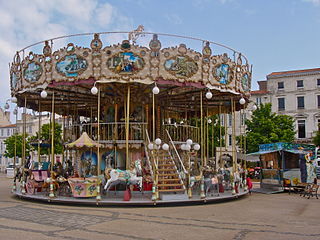
A carousel or carrousel, merry-go-round (international), roundabout, or hurdy-gurdy is a type of amusement ride consisting of a rotating circular platform with seats for riders. The "seats" are traditionally in the form of rows of wooden horses or other animals mounted on posts, many of which are moved up and down by gears to simulate galloping, to the accompaniment of looped circus music.

Book music is a medium for storing the music played on mechanical organs, mainly of European manufacture. Book music is made from thick cardboard, containing perforated holes specifying the musical notes to be played, with the book folded zig-zag style. Unlike the heavy pinned barrels, which could only contain a few tunes of fixed length, that had been used on earlier instruments, book music enabled large repertoires to be built up. The length of each tune was no longer determined by the physical dimensions of the instrument.
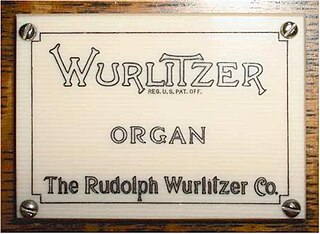
The Rudolph Wurlitzer Company, usually referred to as simply Wurlitzer, is an American company started in Cincinnati in 1853 by German immigrant (Franz) Rudolph Wurlitzer. The company initially imported stringed, woodwind and brass instruments from Germany for resale in the United States. Wurlitzer enjoyed initial success, largely due to defense contracts to provide musical instruments to the U.S. military. In 1880, the company began manufacturing pianos and eventually relocated to North Tonawanda, New York. It quickly expanded to make band organs, orchestrions, player pianos and pipe or theatre organs popular in theatres during the days of silent movies.
Carl Frei was a German organ builder, composer and music arranger who founded a company that manufactured fairground and street organs.

Mortier was an organ manufacturer from Antwerp, Belgium that made dance organs and orchestrions.
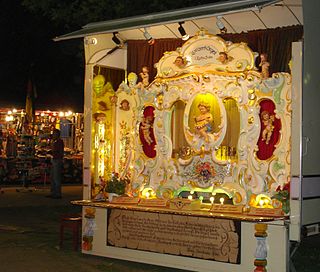
A fairground organ is a musical organ covering the wind and percussive sections of an orchestra. Originated in Paris, France, it was designed for use in commercial fairground settings to provide loud music to accompany rides and attractions, mostly merry-go-rounds. Unlike organs for indoor use, they are designed to produce a large volume of sound to be heard above the noises of crowds and fairground machinery.

A street organ played by an organ grinder is a French automatic mechanical pneumatic organ designed to be mobile enough to play its music in the street. The two most commonly seen types are the smaller German and the larger Dutch street organ.
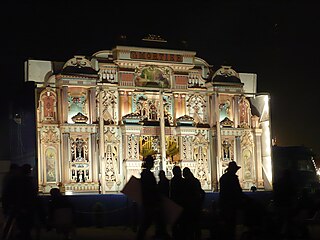
A dance organ is a French mechanical organ designed to be used in a dance hall or ballroom. Originated and popularized in Paris, it is intended for use indoors as dance organs tend to be quieter than the similar fairground organ.
Gavioli & Cie were a Franco–Italian organ builder company that manufactured fairground organs in both Italy and later France.
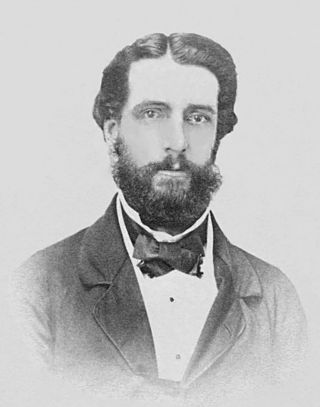
Charles Victor Crosnier de Varigny was a French adventurer, diplomat, translator and writer.
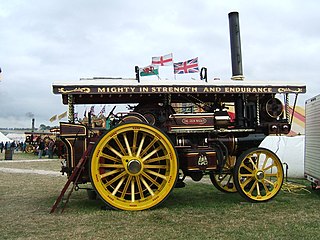
The Scarborough Fair Collection is a museum of fairground mechanical organs and showman's engines, located in Scarborough, North Yorkshire, one of the largest collections of its type in Europe.
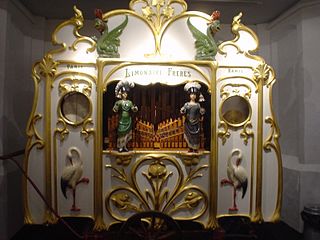
Limonaire Frères were an amusement ride, street organ and fairground organ builder, based in Paris, France, during the 19th and early 20th century.

The North Tonawanda Barrel Organ Factory was a street organ manufacturing company and building, located in North Tonawanda, New York. Started by expatriate German Eugene de Kleist with backing from Allan Herschell, the company was later purchased by the Wurlitzer company.
Baron Frederick Joseph Eugene de Kleist, was a pioneering German organ builder, who in founding the North Tonawanda Barrel Organ Factory, started the American style of Band organs.

The Lombard Odier Group is an independent Swiss banking group based in Geneva. Its operations are organised into three divisions: private banking, asset management, and IT and back and middle office services for other financial institutions. In 2022, the bank had total client assets of CHF 300 billion, which makes it one of the biggest players in the Swiss private banking sector.

Clément Cycles, La Société des Vélocipédes Clément, Clément & Cie was a French bicycle manufacturer that was founded by the industrial entrepreneur Adolphe Clément. From its beginnings as a bicycle repair shop in Bordeaux, through its establishment as a bicycle shop and workshop in Paris to its mass manufacture of a wide range of bicycles from the purpose built, state of the art factory at Levallois-Perret, Paris, the brand always combined advertising and marketing flair with quality products.
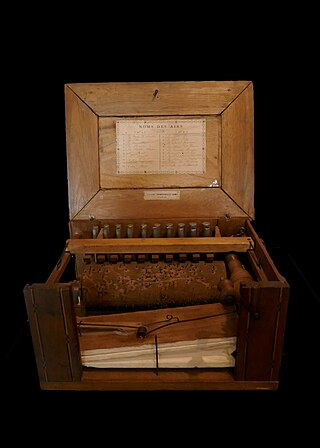
Jérôme Thibouville-Lamy & Cie, abbreviated as "J.T.L.", was a French musical instrument making company, formed in the mid 19th century from the merger of pre-existing makers.

The Société Boigues & Cie was a French ironmaking company based in Fourchambault, Nièvre, founded by a Parisian metal trader. Boigues et fils built a foundry at Fourchambault, Nièvre in 1821–22, the first in France to use the modern English technique of making iron using coal (coke) rather than charcoal. The company became a limited partnership, Société Boigues & Cie, in 1839 after the death of the co-founder Jean Louis Boigues. In 1853 it merged with other companies to form what would be later named the Société de Commentry, Fourchambault et Decazeville

Barrel Organ Museum Haarlem is a museum in Haarlem in the Netherlands. Next to the presentation of a variety of barrel organs, accessory objects and documentation material, there is a ballroom where music of the organs is being played. The museum was opened in 1969 by the foundation Het Kunkels Orgel. Since 2014 it has its current location at a business park at the Küppersweg.

















